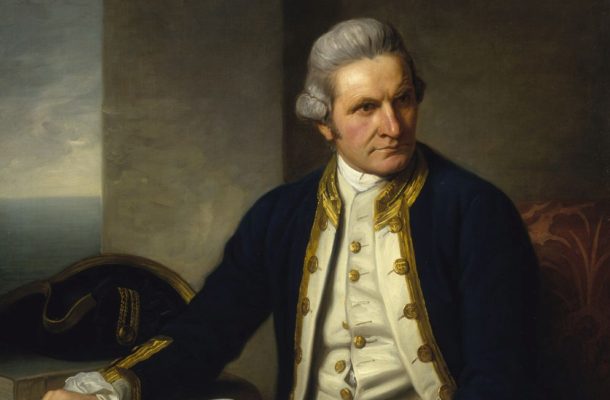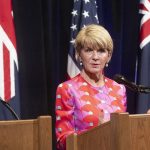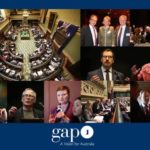Half baked anti-Cook sentiment won’t encourage reconciliation

If James Cook had prepared and carried out his duties to the standard exhibited by many of his present critics, the first expedition of 1768-1771 would almost certainly have ended in disastrous failure.
Instead, his great achievement in measuring the transit of Venus across the Sun and the diligent scientific observations by Green, Banks, Solander and Parkinson represent a lasting contribution to human advancement. James Cook also helped to pioneer the use of anti-scorbutics for the prevention of scurvy in seafarers.
Of course, similar observations would have been made by others sooner or later, but even a perfunctory glance at the legacy of other possible colonial contenders suggests that things might easily have been far worse for the indigenous people of the land we now call Australia. But that certainly does not excuse the unjust dispossession, murder and attempted genocide committed by some of the later arrivals.
Cook’s instructions from the British Admiralty were, inter alia: you are also with the consent of the natives to take possession of convenient situations in the country in the name of the King of Great Britain: or: if you find the country uninhabited take possession for his majesty by setting up proper marks and inscriptions, as first discoverers and possessors.
It was evidently presumed that the instructions given would be compatible with due respect for the native populations of this country.
The journal of Joseph Banks clearly records sightings of Australian indigenous people as well as attempts to communicate and trade with them. The expedition was well aware that the land wasn’t ’empty’ so attempts to attribute Cook’s actions to his (alleged) application of the doctrine of Terra Nullius(empty land) seem irrational and absurd.
Colonial protagonists sometimes relied on the ‘spread of civilization’ to rationalise their commercial, political and territorial ambitions. Paradoxically, their minions, being far beyond the reach of close scrutiny, readily discovered opportunities to profit using ‘uncivilized’ methods of their own. Atrocities and crimes against humanity were apparently justified by dehumanising the victims.
It is indisputable that colonization was the initial stage of a process that destroyed or at least severely damaged the indigenous cultures with which they came into contact. It also seems increasingly likely that our ecocidal culture condemns generations, yet unborn, to live with their health and wellbeing severely impacted by our bequest of a degraded environment to them. Today’s changes to the landscape, the atmosphere and the biosphere become the environment of tomorrow.
The 2018 Commonwealth Government budget includes funding for the ‘Kamay Botany Bay National Park 250th Anniversary Project’. This isn’t just another statue of James Cook, it will have facilities for many more visitors than the present monument and there will be new community education and interpretation programs at the landing site of HMB Endeavour.
The plan is to develop events and exhibitions, including a digital platform and educational material for the anniversary. Whichever way you choose to look at it, the landing was a crucial and undeniable moment in the history of this continent. However, the discovery of it must surely be attributed to its first occupants at least 60,000 years before.
The fact that the project happens to be in the Treasurer’s electorate should not diminish the prospect that, if done well, it may be expected to more than repay the estimated $48.7 million cost by attracting large numbers of visitors. For comparison, the 9/11 museum and memorial in New York cost more than a thousand million Australian dollars to build.
The expenditure of countless $billions on ‘indigenous affairs’ bureaucracy does not seem enough to placate the self-appointed guardians of the national conscience. Meanwhile, the health, education and wellbeing of the first Australians continues to decline. Nor do many complain about the hugely disproportionate amount spent by Australia on war memorials, by comparison with other Commonwealth countries that were involved in the same conflicts.
Even the gross misuse of more taxpayers’ $billions on, say, the Murray-Darling Plan, as it has actually been implemented, seems not to have appeased our demons. The opportunity costs in the form of health, education, transport, economic infrastructure and other environmental remediation works foregone are self-evident. Action based on good intentions alone is naïve and often counterproductive.
However, the Cook landing anniversary project should not be used to inhibit continued progress towards true reconciliation. It may well serve to raise awareness among all Australians of the need for reconciliation as an essential and integral part of our growth as a nation. Opponents of the Project might do better directing their energy to ensuring that it does include elements designed to foster understanding and to promote well-defined steps towards a just and complete settlement.
It’s hard to think of a great discovery or human endeavour that does not have potential for ill as well as for good. Cook’s expedition was for scientific purposes but it is arguable that, especially in the scramble for moral rectitude, the importance of the science tends to be grossly under-recognized.
Self-loathing appears to be fashionable among so-called ‘progressives’ at present. That may rationalise pretentious moral superiority, but it does nothing to right wrongs or discover new ways forward. To condemn Cook for later alleged misuse of the knowledge he gained at the cost of his life is unjust. We might as well condemn Pasteur, Nobel or Curie for the later obscene abuse of their great discoveries.
What we choose to neglect can be as revealing as the things we honour: monuments to political failure or the darker secrets of ‘the cringe’ are usually ‘more honoured in the breach than in the observance’. But there is rarely acknowledgement of the great achievements of Cook or the pioneers to whom we owe our comfortable existence. It seems to me that this attempt to debunk Cook is merely a surrogate for half-baked Australian republican sentiment.
So what are some of the potential ramifications of this for the future governance of Australia? The Queen recently asked that Prince Charles be appointed as the next head of the Commonwealth, but it is the institution that matters, not the person sitting on the throne. The preamble of Australia’s constitution says that the people rely on the blessing of Almighty God (sic).
I’m content to interpret the word ‘God’ in this context as representing our ideals, aspirations and diverse ways of being. By acknowledging our imperfection and corruptibility and placing ultimate power, at least in theory, beyond the grasp of would-be tyrants, we are less likely to become victims of our own folly.
The federal opposition leader has promised a referendum to ask if Australia should become a republic. Mr Shorten says “we are Australian, not Elizabethan.” Reviving the republic debate with silly patriotism is apparently designed to drive a wedge between the PM, who is a republican, and the conservative wing of the Liberal Party.
If we get rid of both “God” and the Monarch, important questions would remain about what form the Republic of Australia should take. Mr Shorten is evasive on this point but it’s a fairly safe bet that most voters favour direct election of the head of state and not appointment by the Parliament.
Assuming that the constitutional reforms needed to create a workable system were to be passed at a subsequent referendum, the Parliament might soon find itself in conflict with the President, possibly supported by powerful media or multi-national corporate interests.
Trying to strictly regulate the powers of the head of state can have the opposite effect to what is intended. For example, could a future President interfere with democratic institutions in the name of some cause we can’t yet imagine because the constitution does not specifically prevent it.
The standoff between the US president, the Congress, even the courts, results from their founders not clearly defining and limiting the powers of the President. But to be fair, they could not have expected a fool would ever be raised to the highest office. Of course, there’s no risk of incompetent or unethical people getting elected in Australia, is there?
The Monarch embodies the values and unifying principles of the people. At the same time, the monarchy is an institution that transcends both the state and the monarch. Do we really want to send legislation for assent by someone called ‘The President’ in a rush to be ‘relevant’ and fashionable or to convince ourselves that we are at last truly ‘multicultural’?
We may tear down the statues, revise the history and erect monuments to ideology or pass regulations to guide the perfection of humans, adding blood, tears and suffering for good measure. That is the time-honoured prescription for tyranny. Alternatively, we could resort to some form of artificial intelligence and name it ‘Gaea’, after the Greek God of Earth who, in Green ideology, is indifferent to humanity.
Apart from themselves, what in the European phase of Australian history do the opponents of the Cook landing anniversary project find worthy of commemoration and how should it be done? An Australian republic and a mongrel system of government i.e. neither fish nor fowl, would be a logical extension of the anti-Cook sentiment.
But that would be carved from much harder stone than any paint-splattered Cook monument. History shows that freedom is far more difficult to regain than it is to lose, and the price of removing monuments to political misadventures is often paid in blood.
Having said all of that, it may seem contradictory to say I am not opposed to Australia becoming a republic per se. It is just the danger of jumping carelessly from the present post-colonial but tolerable ‘frying pan’ into the inferno stoked by a devil we don’t know, that I find most worrying.
The Constitutional Monarchy has served Australia well but in some respects it is cumbersome, unnecessarily expensive and not well suited to our present and probable future circumstances. The Constitution of Australia is silent on many of the salient and politically-charged issues of our time.
However, according to Constitutional Lawyer, Dr Bede Harris, by demanding electoral reform, Australians could build a more representative system of government and take the first cautious steps on the road to constitutional change.

Max Thomas, Dip. Agric. (retired) worked in the public sector and in private consulting on a range of land, water and waste management projects. He prepared guidelines for irrigation with recycled water for EPA Victoria and developed a number of Environmental Management Systems in the water industry.














